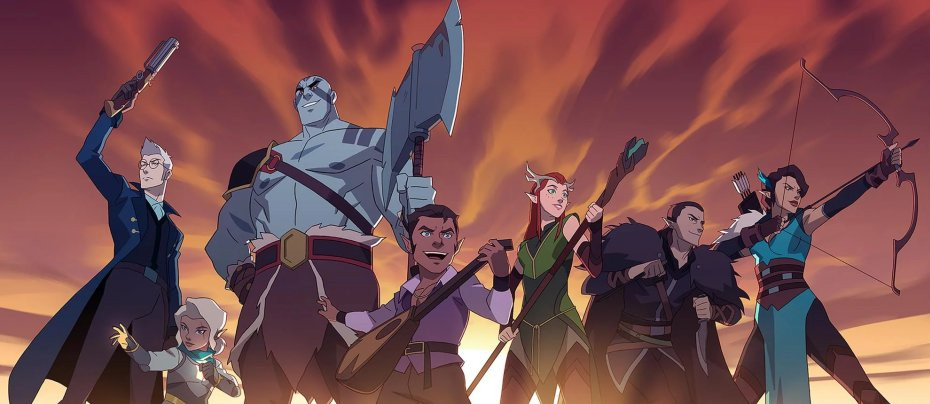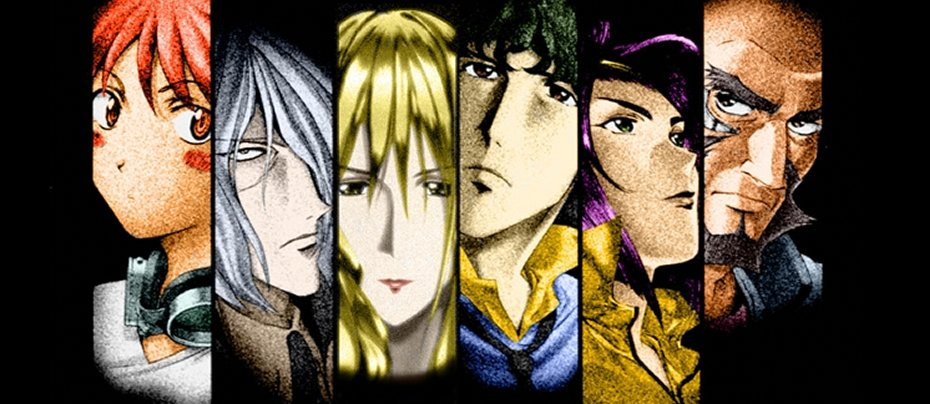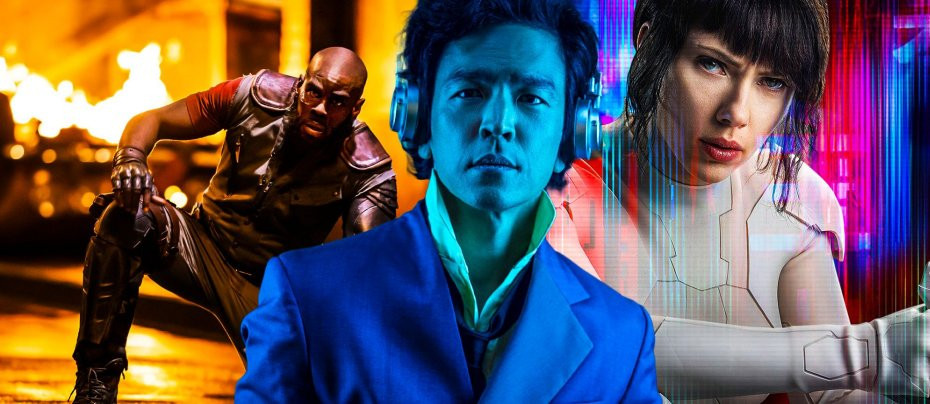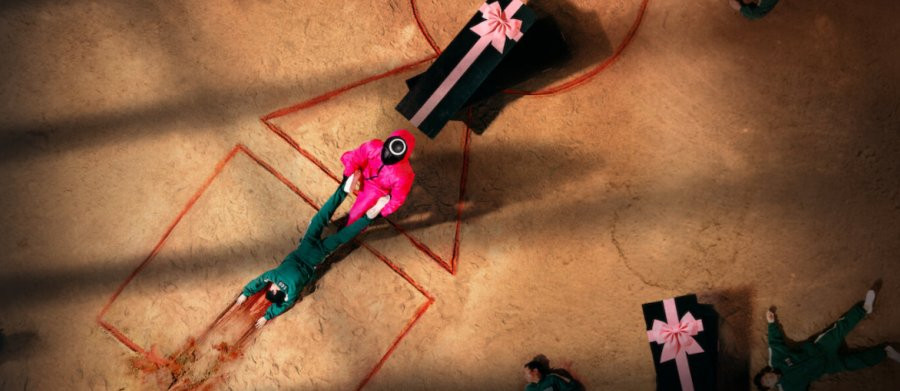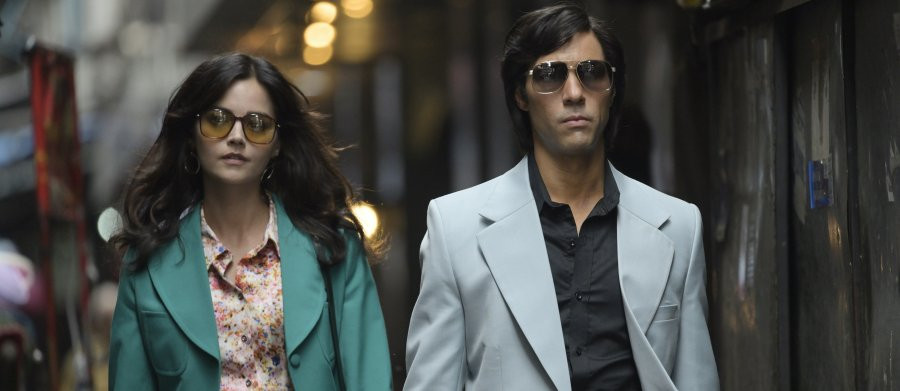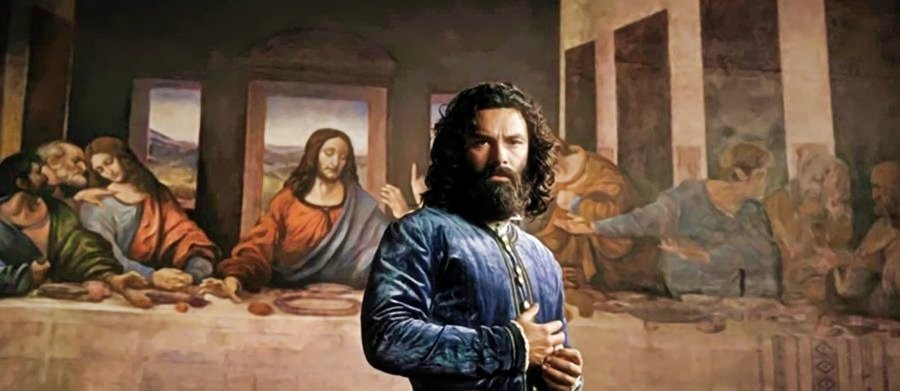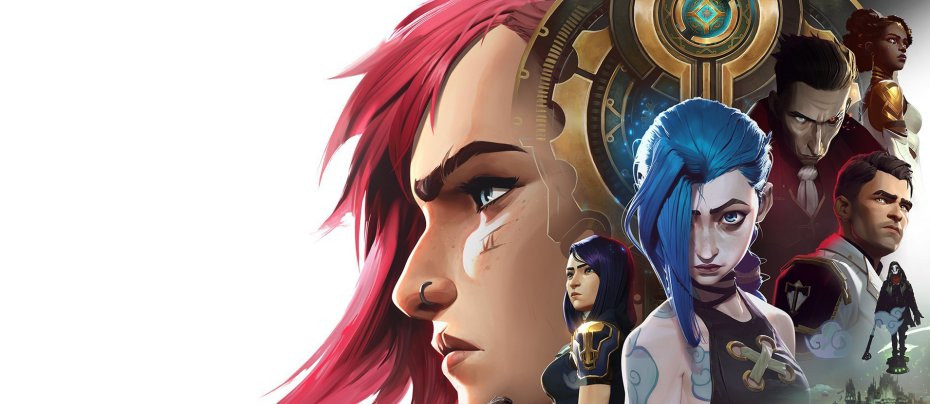
Arcane
2021 - France Usa"Adapting (a video game) for film or television usually means either offending game fans, who are a vital segment of the target market, or reducing the viewer to the equivalent of an entirely passive observer of the game"
Review: John Winterson Richards
Back in the days when television was basically just the big networks, the objective was to get a "water cooler moment," a show people would be discussing around the water cooler at work the next day. It is streaming services who are now more likely to get "water cooler moments" - or would be if people still used water coolers or indeed were at work the next day: it is ironic that shows like the Netflix Squid Game and Amazon's The Boys have generated conversation, but online rather in person, because people have watched them more while in quarantine.
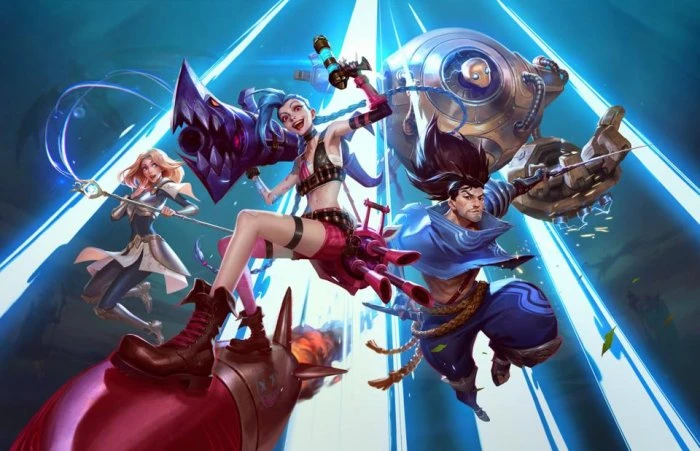
While it did not attract the huge audiences and mainstream media attention that Squid Game did, the Netflix Arcane, also known as Arcane: League of Legends, belongs in the same category. It is more of a "cult" item in that relatively few - but still quite a lot - have watched it but those who have were usually moved by it and tend to talk about it: the viewer appreciation scores on the likes of IMDb and 'Rotten Tomatoes' are phenomenal.
For many it was their first introduction to the "adult 'anime'" genre - not to be confused with "adult animation," which is something else altogether and happily beyond the scope of this website. "Adult 'anime'" is animation in the Japanese 'anime' style with themes and stories that are not for young children. It is a well established genre in the East, so Arcane is by no means as original as many of its Western fans might have assumed. Its significance is that it may be remembered as the show that made the style respectable with mainstream audiences here.
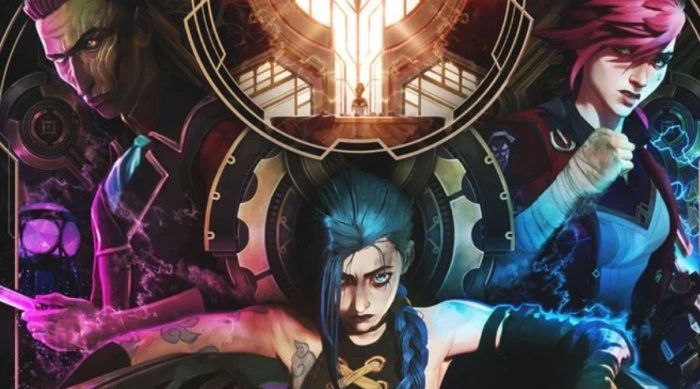
It may also have made the lowest form of adaptation more respectable. It has been a common complaint for some time that too much supposedly "original" programming is really adapted. Of course, the adaptation of books and plays for film and television has an honourable history, but the irritating trend towards reliance on the adaptation, or "updating," of previous film and television projects is generally considered a symptom of decline. Even lower in the hierarchy of esteem is the recent fashion for adaptations of American "comic books" and Japanese "manga," but, amid tons of juvenile rubbish, this still produces the odd diamond, like Jessica Jones, The Boys, and Invincible. Although Arcane looks as if it is based on a "graphic novel," it comes from a lower level still, the very bottom of the heap, adaptations of video games.
The best video games are now products of considerable narrative, technological, and aesthetic sophistication. There seem to be true artists at work in some of them. However, what makes for a good first person gaming experience does not necessarily make for an involving story, characters tend to be superficial, and their worlds do not have to make sense. Adapting them for film or television usually means either offending game fans, who are a vital segment of the target market, by changing everything, or reducing the viewer to the equivalent of an entirely passive observer of the game, depriving him/her of the adrenaline rush of active participation without offering much in the way of depth of emotional experience in return. While, again, there are exceptions, the list of film and television adaptations of video games is notable for its high number of critical and commercial disasters. Corporations have poured money into popular and expensive intellectual properties in the greedy anticipation of kickstarting multimedia franchises, and achieving the fabled "synergy," only for their well made but soulless products to be recognised for what they are by game fans and general audiences alike.
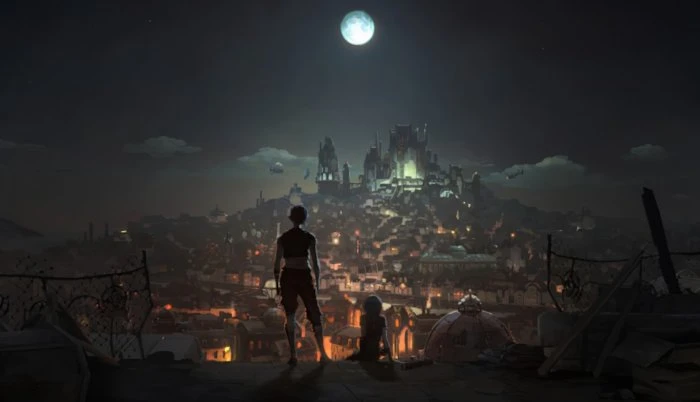
What Arcane seems to be offering is a new model for such adaptations. It takes the most attractive aspect of the video game, its popular and visually distinctive characters, and puts its focus on developing them. The story and the world in which it takes place are then built around them. The story itself is nothing special and serves only to reveal the true nature of the characters under pressure, and we are shown only as much of an evidently very complicated world as is necessary to explain the characters. This works because the characters work. We are lured in by the promise of action, but we stay for the human interest. It is therefore a video game adaptation that seems nothing like a video game. That is the great secret of Arcane.
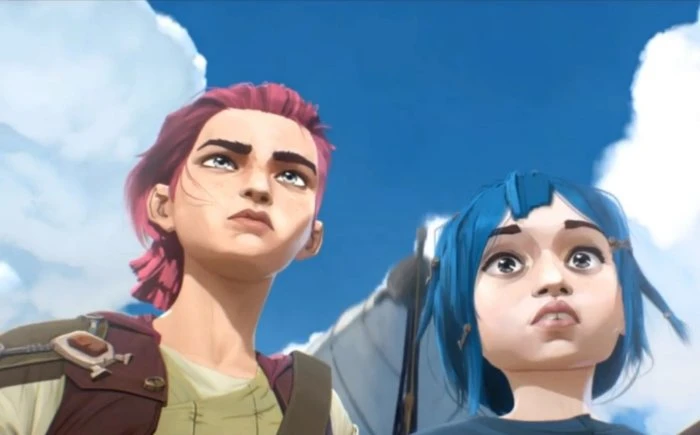
The story seems at first oddly familiar. We meet two sisters struggling to survive in a city-state that is divided radically between rich and poor districts. This division was increased by a failed rebellion by the poor. Living in the poor district has forced the older sister to become tough and resourceful, but she is very protective of her more vulnerable and intelligent younger sibling.
We might think we know where this is going. Is this a cartoon version of The Hunger Games? The script seems to hint at this and then makes a deliberate decision to go in another direction. Although some characters want to start another rebellion, it seems an unlikely prospect. In any case, the rich are not shown actively oppressing the poor. They are simply ignoring them.
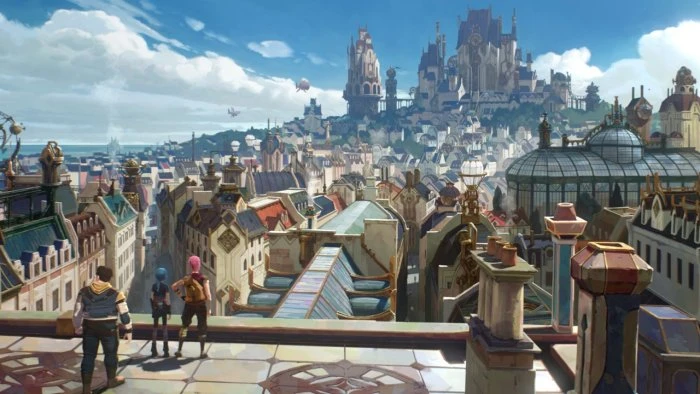
It is therefore ironic that the motto, almost the obsession, of the rich is "Progress." They are indeed getting richer, especially when a brilliant young scientist finds a way of combining scientific technology with magic. The reaction to this is at first exactly what one would expect if a scientist in our world suggested doing the same, but he proves his concept just in time and powerful commercial interests soon see the potential. Our heroic scientist and his research associate, who was born and raised in the poor district, are eager to make the benefits available to all, including the poor, but others are more cautious.
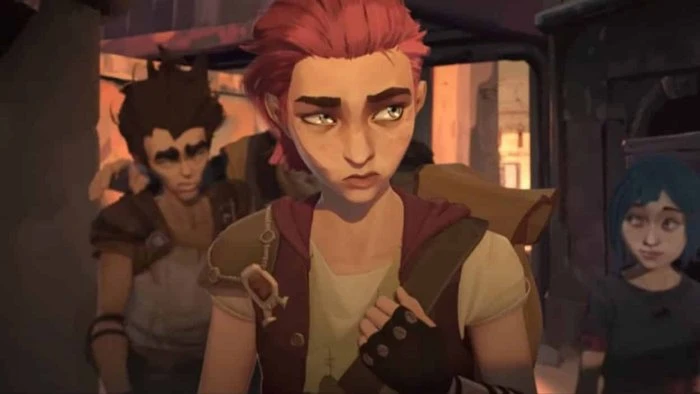
Yet the decision has already been taken out of their hands, because some of the new technology is already in the hands of the poor after it was stolen by our sisters, Vi and Powder, in a daring daylight raid on the rich district. Those who want another rebellion see the technology as the key to achieving their objective of independence from the city-state and are desperate to get their hands on it. This triggers a series of tragedies.
There is nothing particularly new about the plot device of combining science and magic. After all, the great anthropologist Sir James Frazer tells us that magic is basically just the word we use for the science we do not understand yet. What really matters is how the existence of such a thing impacts on the various characters. This is obviously a metaphor for other forms of technology, such as the internet: is it really the great equaliser and liberator of the poor it was proclaimed to be or is it just another way the rich can get richer by tightening monopolies?
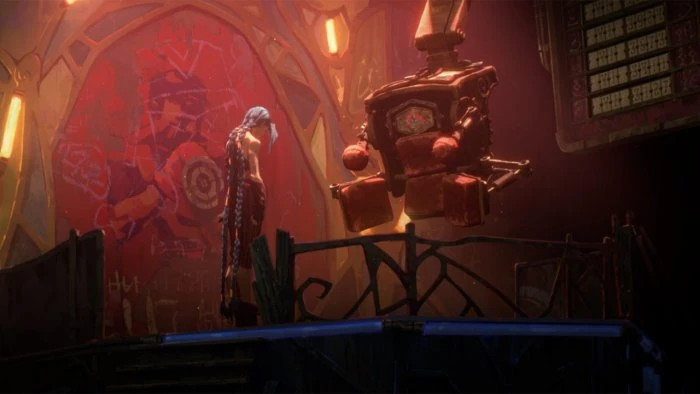
The great strength of the script is that it asks the question and offers no easy answers. All the characters have different points of view and most of them are defensible - or at least they are understandable when one is shown how their situations and experiences have led them to their different conclusions. This is deep thinking from a show supposedly based on a video game.
Vi evolves: she starts out as something of an anarchist: although not an activist, she is angry and aggressive, and she is sympathetic to the idea of another rebellion, but she comes to understand the practical dangers of the technology. Powder, highly strung and the victim of an emotional crisis, goes another way. Yet, even when she does horrible things, we remember the innocent child she was and cannot help feeling that her transformation is not her fault.
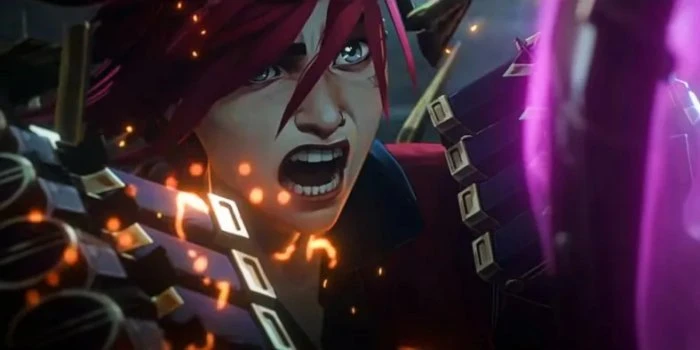
The young scientist, Jayce, seems too good to be true - he is from a minor patrician house and just happens to have the torso of a body builder because, we are told, his family grew rich making hammers (!) - and too good to be true is how he turns out to be. His inexperience leads him to make mistakes and he is forced to admit he is wrong. That he does admit he is wrong shows that, like Vi, he has matured. Heimerdinger, the voice of the Establishment opposed to Jayce, is not some dogmatic reactionary or greedy industrialist but a benevolent scientist with legitimate concerns about the safety of the new technology which turn out to be well founded. Yet even the kind and intelligent Heimerdinger has an intellectual blind spot: he does not understand the poor, nor has he apparently given them much thought at all - until losing political power prompts him to go among them, so that even he matures.
Other characters are similarly multi-dimensional, even relatively minor ones. No one is all good or all bad, and all have reasons for what they do. The most interesting character arc is that of a ganglord who is set up as the principal villain - he is even drawn as such, with exaggerated ugliness. Yet his motivation is ultimately political and his objective of independence for the poor district is at least understandable, even if it is unclear if they would actually be better off apart from the rich district. Of such ruthless, committed men are Fathers of Their Countries made - but he is forced to make a straight choice between the cause to which he has dedicated his life and someone he loves. It is hard not to feel sorry for him.
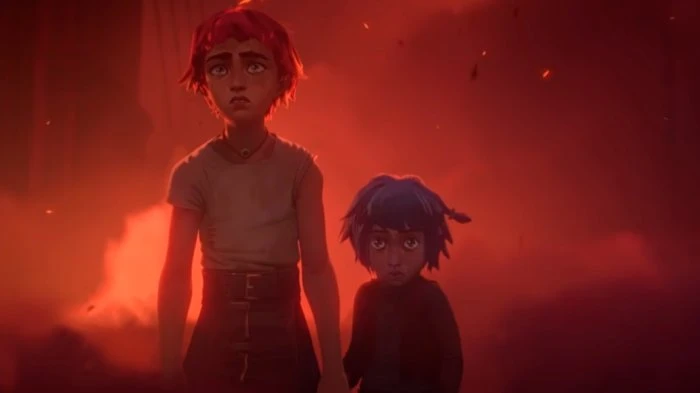
Along with this characterisation, the other great strength of Arcane is its visual style. The French animation studio Fortiche blends different styles to stunning effect - one crucial fight scene uses "street art" and rapid cuts to convey the visceral energy of the encounter. The scenes set in the rich districts are obviously influenced heavily by Hayao Miyazaki and Studio Ghibli: there is a lot of light and colour, the culture has a late 19th Century or possibly early 20th Century feel, and the initial technology has a definite "steampunk" vibe to it. The scenes in the poor district are darker, and, while they suggest a less developed historical period than those set in the rich areas, there are also references to a more modern urban style. The contrasts in the look of the districts are a reflection of the more fundamental differences between them.
Some elements seem surreal. Not all of the characters are human: Heimerdinger looks like a cross between a little old man - very old as it happens - and his own pet "Poro," itself a cross between a cat and a small dog. The animators, both those working for Fortiche and those who worked for the original games developer, Riot Games, have let their imaginations, er, run riot. If, as is usual in such situations, little is entirely new, lots of good ideas from different sources are bound together cleverly to build something that is fresh and engaging - and that stimulates both the mind and the senses more than one has any right to expect from a video game adaptation.
John Winterson Richards is the author of the 'Xenophobe's Guide to the Welsh' and the 'Bluffer's Guide to Small Business,' both of which have been reprinted more than twenty times in English and translated into several other languages. He was editor of the latest Bluffer's Guide to Management and, as a freelance writer, has had over 500 commissioned articles published.
He is also the author of ‘How to Build Your Own Pyramid: A Practical Guide to Organisational Structures' and co-author of 'The Context of Christ: the History and Politics of Rome and Judea, 100 BC - 33 AD,' as well as the author of several novels under the name Charles Cromwell, all of which can be downloaded from Amazon. John has also written over 100 reviews for Television Heaven.
John's Website can be found here: John Winterson Richards
Seen this show? How do you rate it?
Seen this show? How do you rate it?
Published on January 13th, 2022. Written by John Winterson Richards for Television Heaven.


